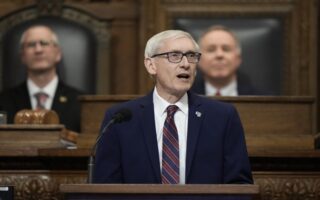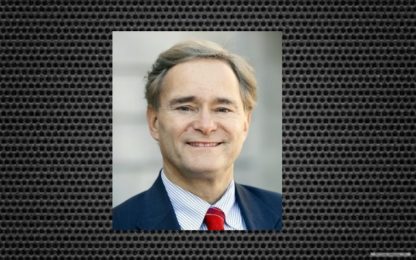Democrat Tony Evers inaugurated as new Wisconsin Governor

MADISON, Wis. (AP) — Newly sworn-in Democratic Gov. Tony Evers called for a rejection of “the tired politics of the past” in his first speech as Wisconsin governor Monday, cautioning in his inaugural address that “we’ve become content with division.”
Evers delivered the speech during a packed Capitol rotunda ceremony attended by a number of other office holders and five former governors, including Republican Scott Walker , whom Evers narrowly defeated in November.
Evers’ ascendance as governor marks a new era in Wisconsin politics, ending eight years of Republican dominance.
Evers called for a return to the values of kindness, respect and civility and urged Republicans and Democrats to set aside party allegiances to work for a greater good. Evers will need Republicans to advance much of his agenda, given that the Legislature he will be working with is under majority GOP control.
While some have said divided government is a recipe for gridlock, Evers called for compromise. Republicans are already preparing to write an alternative state budget, which Evers has threatened to veto.
“We must turn the page on the tired politics of the past, we must lead by example,” Evers said. “It’s time to remake and repair our state and reclaim our better history. The people of Wisconsin demanded a change this November, and that change is coming.”
Evers said that change will begin on playgrounds and college campuses and in classrooms, coffee shops, churches, workplaces and the Statehouse.
“May we dare to transcend divisiveness and party line,” he said. “May we have courage in our conscience. And may we be willing to do what’s best for the next generation rather than the next election.”
Evers emphasized his campaign priorities, including fully funding public schools “at every level” from pre-kindergarten through college; making health care more affordable and accessible; and improving the conditions of Wisconsin’s roads.
“We cannot fix these problems unless people come before politics,” Evers said. “We’ve become paralyzed by polarity and we’ve become content with division. We’ve been indifferent to resentment and governing by retribution.”
This marks the first time since 2006, when Democrat Jim Doyle was governor, that the entire Legislature is controlled by the opposite party of the governor. In 2007 and 2008, Doyle was governor and Democrats had control of the Senate, but Republicans had the Assembly. In 2009 and 2010 Democrats controlled everything, and since 2011 Republicans had it all.
Walker and the GOP used their power to transform Wisconsin by enacting a host of conservative priorities, including all but eliminating collective bargaining for public workers and putting in place electoral boundaries that favor Republican incumbents.
Evers is expected to deliver his first State of the State speech later this month, then present his budget to lawmakers in late February or early March.
Walker and Doyle were joined by three other former Wisconsin governors at the inauguration: Tommy Thompson, Scott McCallum and Martin Schreiber. Among the others who attended were both of Wisconsin’s U.S. senators, Ron Johnson and Tammy Baldwin, members of Congress, Milwaukee Mayor Tom Barrett and numerous past office holders.
Evers took the oath of office from Wisconsin Supreme Court Chief Justice Pat Roggensack.
In addition to Evers, all other constitutional officers elected in November were also sworn into office. They are all Democrats, marking the first time since 1983 that all offices will be held by Democrats.
Those sworn in were Lt. Gov. Mandela Barnes, Attorney General Josh Kaul, Treasurer Sarah Godlewski and Secretary of State Doug La Follette. La Follette is the only incumbent.
Barnes, the first African American lieutenant governor in Wisconsin history, said “the gravity of this moment is not lost on me as we strive for equity.”
Newly elected members of the Legislature will also take office. In the Assembly, 63 Republicans and 36 Democrats will be seated. Of them, eight Republicans and seven Democrats are new. In the Senate, 11 Republicans and six Democrats are taking office. Of them, three Republicans and one Democrat are new. Republicans will hold a 19-14 majority.






